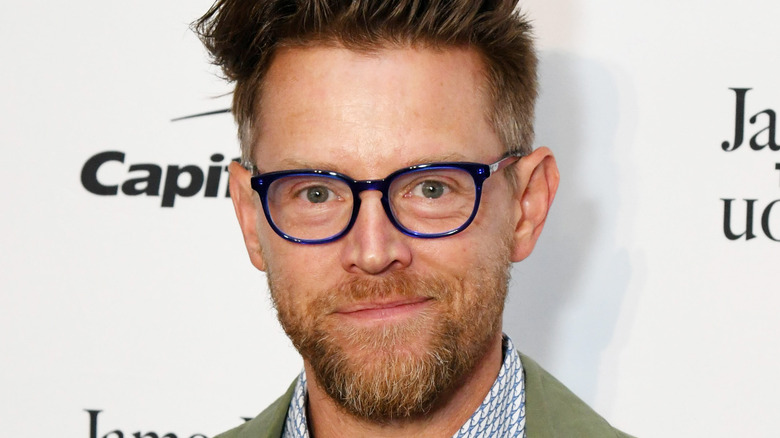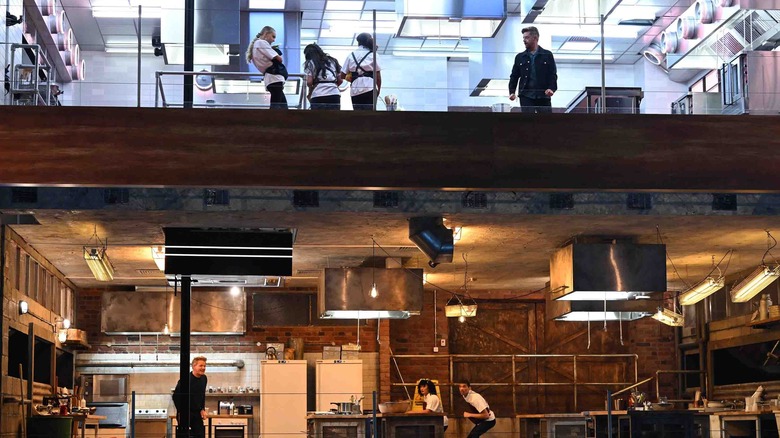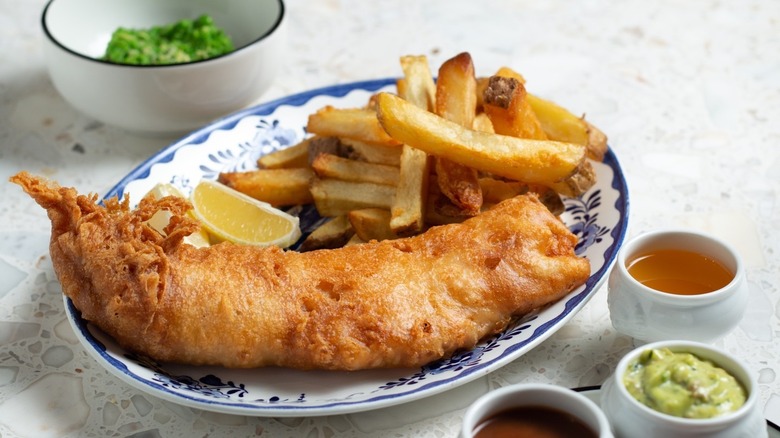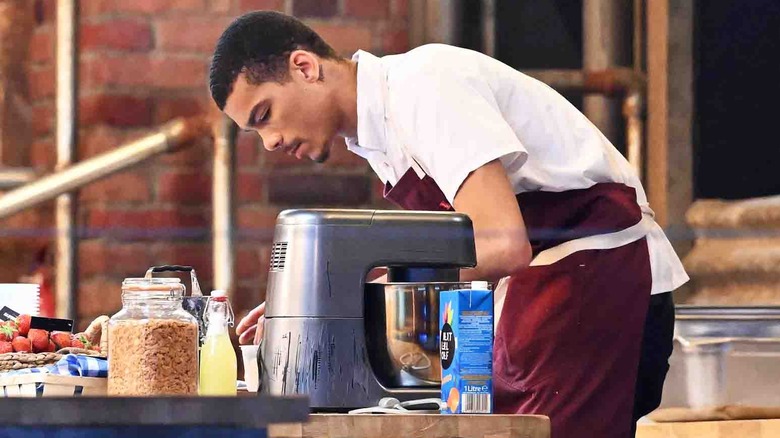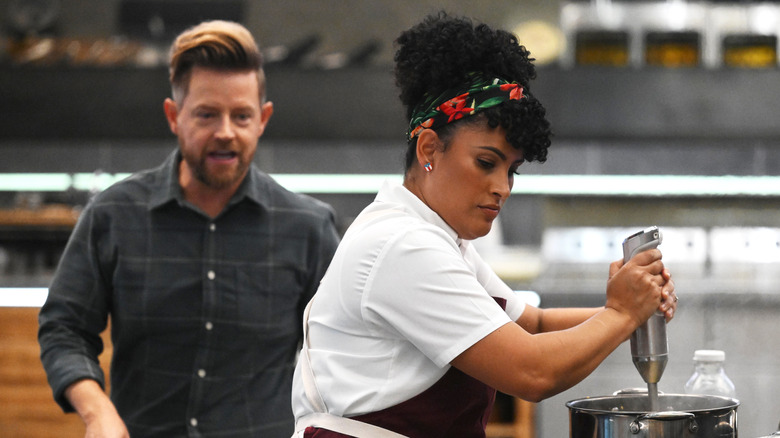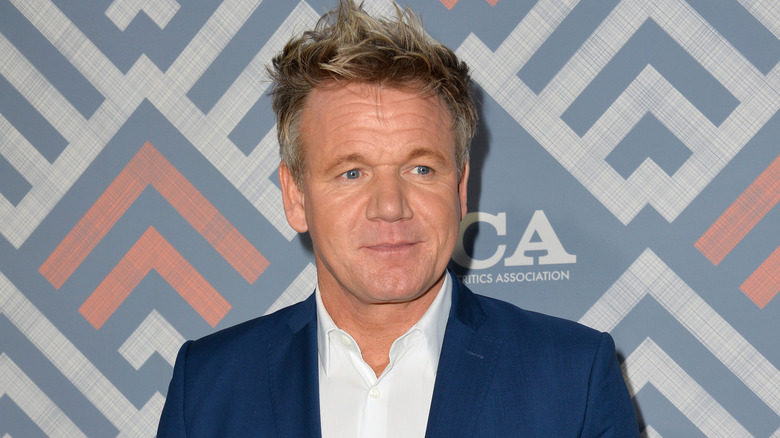Chef Richard Blais Talks Taking TV And Cooking To The Next Level - Exclusive Interview
Richard Blais is a man of many projects. From his restaurants that span from coast to coast, his multiple cookbooks, and his podcasts, Blais has his fingers in nearly every aspect of the food world. Known for his classic dishes that are both familiar and upscale, Blais has made a name for himself showing just how far American cuisine can be taken. Blais started his culinary journey with humble roots at possibly the most American of all restaurants — McDonald's. Since then, Blais has been a trailblazer in the kitchen and on the screen.
If you have seen a cooking show, you likely have seen Blais, who has appeared in such series as "Chopped," "Top Chef," "Cutthroat Kitchen," and "Guy's Grocery Games." Now, however, Blais is helping the next generation of chefs through one of the most intense and ambitious cooking game shows to date: "Next Level Chef." Along with chefs Nyesha Arrington and Gordon Ramsay, Blais is mentoring a whole new generation of chefs through the show's second season, the finale of which will premiere on May 11. We caught up with Blais to discuss the show and how he takes his cooking to the next level.
Next level television
You've been involved with a number of cooking competition shows, and in previous interviews, you've talked about how you wanted to do "Next Level Chef" immediately when you saw the treatment. What was it that made it so eye-catching?
Even from the viewer's perspective — and I watch the show as a viewer, which is something that's rare for me — the first thing is right there in front of you: the three-story set. I love design and interior design of kitchens. Having those three environments, which are almost ... They become their own worlds. I knew right off the bat. I was like, "This is cool. They get to be in the basement and they don't have any tools, and then they're on the top level and they have everything they would ever want. Are they going to use everything that they would ever want? Would they even know how to use it?"
Then you have a dull knife and you're chained to the stove. Gordon Ramsay's yelling at you in the basement. It's like a horror film down there. I loved it visually. Being inside of it, it is that feeling like you're in Yankee Stadium, so to speak — you're in the arena and it's all right there, and it's sacred.
What's something that people would find surprising behind the scenes from "Next Level Chef"?
The behind-the-scenes part that's always surprising with "Next Level Chef," especially this season, is the amount of work that goes into getting all of those Michelin-starred ingredients on the platform. The real chefs who are behind the scenes are making sure that we have the fish that was caught two days ago, the dry-aged wagyu steak, the mushrooms that were foraged by a PA the day before. I don't know if a PA foraged the mushrooms. But the hard work that goes in on the culinary art side behind the scenes — real chefs, talented, Michelin-starred chefs are actually helping produce those platforms.
Working at McDonald's
Your first professional job was at McDonald's. Did working in that fast food environment compare at all to the time-limited kitchen of "Next Level Chef"?
It is hard for me because I'm a little older now, but fast food and working in that environment taught me a lot about structure, how to organize things, how to play with your team's strengths. It's taught me a lot about strategy, coaching, leadership, [and] organization. I bring all of that to "Next Level Chef," so it has trained me well.
Now that you have elevated past the Filet-O-Fish sandwich, do you have any tips for cooking the best fried fish sandwich?
Oh my gosh, I do. I did just open up a restaurant called California English, where we do fish and chips. To me, the best fish sandwich is one that is crispy and fried. It is a batter, and the secret is adding a little vodka to your beer batter. The vodka doesn't have any flavor, but when you fry it ... If you've ever put alcohol in a pan, it sort of flambés — it dries out the crust and you get this really crispy texture on it. You can get a to-go order of it and drive 30, 45 minutes, and it'll still be crispy when you get to where you're going.
That's the dream.
That's the key right there for the crispy fish sandwich.
From the home to the stage
Do you have any tips for home chefs who are looking to hone their cooking skills?
They should play "Next Level Chef" at home. The way to do this is ... You can't get the platform yet, but maybe we'll be working on it. Don't quote me on that. We'll come to your front yard with a three-story bounce house of ... It's a fun zone. That's what we should do — we should do a next-level bounce house.
But go to a neighbor's house, or you can even do it in your own kitchen. Stand in front of the fridge, set a clock for 20 minutes, and open up the fridge. In 20 seconds, grab a couple ingredients, close it, and you can't go back to the fridge. Now you have to cook and just go for it.
The point there is [to] cook a little bit more in the improv setting. Open up the fridge, open up a box of pasta, and go for it. That's the tip. Cook a little bit looser and have more fun. Add vinegar. If I have to be real chef-y about it, a little splash of vinegar or acidity, a little lemon juice, always usually wakes up a dish.
I like that. On the show, you've helped mentor people out of the basement level. How do you help them deal with cooking with subpar equipment?
I like to try and flip the mentality of it and treat it like it's an advantage down there. It can be, because you have a lot less thinking to do. You're going to grab whatever's left, so you don't have to worry about, "Oh, I missed the filet mignon and the lobster." It's there or not. That frees a lot of creative space.
For most people, every cook should have a one-pot meal in their repertoire. All of these chefs do have the capability to do it. Once you release the pressure of being in the basement, that's the key. Then, it's just conceptualizing what those random ingredients are. For me as a mentor, that's what I'm good at. I consider myself the strategist of the three mentors. I might not be the best exercise bike instructor of the three of us, perhaps, but I'm the one who's going to tell you, "This is the game plan. This is the formation we should run, and this is how we're going to score."
Surprises never stop
What's one of the most common mistakes you see on the set?
The most common mistake is not grabbing enough ingredients. That's because there's a fear to not knowing what to do with an ingredient. That's an easy fix for the mentor, so using your resources that you have, your mentor — "Oh, I grabbed elder flower syrup." Okay, not a problem. "I want to make an Italian dish, but I grabbed soy sauce." Not a problem — the mentor can help get you through those things.
But if you only grab a parsnip, an onion, and a leaf of parsley, there's not much we can ... Not even Gordon Ramsay can wave his magic wand and do something in that regard. You have to get enough ingredients. I'm going to call myself out — my kids keep telling me this. I keep saying at the platform, "If you can grab it, you can get it." When I hear myself say it ... what I'm trying to tell them is, "If you can still reach it as it's moving, grab it. Don't leave something on that platform. Grab the extra thing. The bottle, the herbs, whatever it is."
That's the biggest mistake, not grabbing those things. Sorry — now I'm really excited about this. That's what I try to do with my team. We don't get to spend time with them. We get the couple seconds before they launch; that's all. There's no pre-game plan that you don't see ... I also run with them to the platform, I don't know if you've noticed, and I'll be on the platform as another set of eyes. "There's caviar right there. There's a lobster tail over there. You can grab that if you want." I'm trying to help them as much as I can without physically using my hands.
What's been one of the most surprising dishes this season?
There's been a number of them. The specific dish doesn't strike me. I believe it was a baccala fritter that Omi [Hopper] made once that was truly one of the better things I've tasted throughout "Next Level Chef" and all cooking competitions. Mehreen [Karim], who's on my team, cooked a number of dishes that ... [had] seaweed and vanilla and these combinations where I backed away and was like, "You're a wizard. You go do you what you have to do here." That was incredible.
Tucker [Ricchio] did a gnocchi once — this was recently. It was a steak with some gnocchi that was beautiful, pillowy gnocchi. Preston [Nguyen] made gnocchi with potato flakes one time. That was incredible ... Tineke [Younger] from my team did a beef tongue tostada [that] was incredible — lots of great dishes this year, for sure. Chris [Spinosa] did a collar of fish, which was super brave and maybe borderline insane, but it fits his M.O. That was delicious — so many delicious dishes.
The beef
Between your steakhouses — Ember & Rye — and the recent surf and turf episode on "Next Level Chef," there's been a lot of steak. What is the secret to the perfectly cooked steak?
The secret to the perfectly cooked steak is you do need to get enough char on it, but depending on the cut of steak, not too much. You want that Maillard reaction — not to turn into a science dork, but the browning of protein is what makes our mouths water when there's a steak on the grill. You want to get just enough sear to it. Then, you have to cook it ... Most people undercook their steaks. If you're at home and you've got a two- to four-inch thick steak, you want to sear it in a pan, pop it into the oven and let it cook for probably 20 minutes. When you pull it out, throw in some whole butter, some herbs, and then baste that steak in a pan on top of the oven if you're not using a grill.
That's it. Then you have to let it rest. You have to let the steak rest for as long as it cooked, which is hard on "Next Level Chef" because they don't have that time. But if you're cooking at home, those are the tips for a perfect steak.
Obviously, competition is hot between the contestants on the show. What kind of competition is there between you, Gordon Ramsay, and Nyesha Arrington while you're working?
We're competitive chefs, so there is competition. We will give it to each other in the elevator. Sometimes you'll see some fist bumps or some looks, and it's like, "We want to win, for sure." For me, the biggest competition behind the scenes is Gordon and I — the battle of the hair, the battle of Gordon. He loves to go at me. It's one of those things ... I'm from the East Coast, and I think he likes me. I think that's what it is. But I love going on social media and seeing people get into hot debates about who has the better hair. No one can compete with Nyesha ... I can't hang with her.
The season finale of "Next Level Chef" will premiere on Fox on May 11, 2023.
This interview has been edited for clarity.
